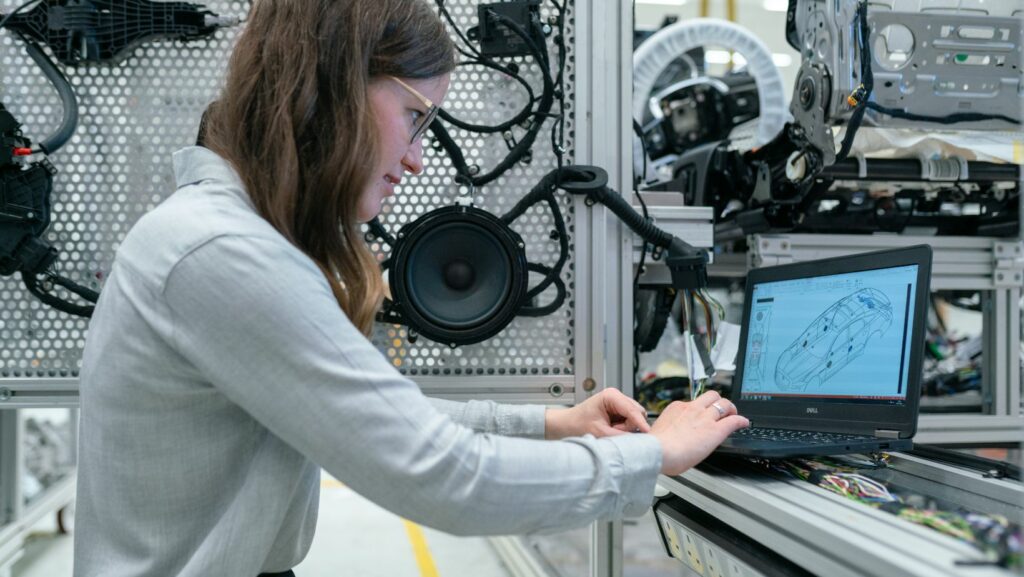Key Takeaways
- Comprehensive Training: Mechanic tech schools provide hands-on and theoretical training in automotive technology, covering essential skills like engine repair, electrical systems, and modern advancements such as electric vehicle technology.
- Industry Certifications: Many programs prepare students for important certifications from organizations like ASE, which boosts employability and demonstrates proficiency to potential employers.
- Networking and Internship Opportunities: Students often benefit from strong industry connections, giving them access to internships and job placement services, facilitating smooth transitions into the workforce.
- Diverse Career Options: Graduates can pursue various career paths, including automotive technician, diesel mechanic, and electric vehicle technician, reflecting the diverse needs of the automotive industry.
- Accreditation and School Reputation: Choosing an accredited and reputable mechanic tech school is crucial for quality education and ensuring favorable job prospects after graduation.
- Financial Considerations: Evaluating costs, exploring financial aid options, and assessing the return on investment are essential steps in selecting the right mechanic tech school for individual circumstances.
Choosing a career in automotive technology offers a world of opportunities, especially for those passionate about cars and machinery. Mechanic tech schools provide the essential training needed to excel in this dynamic field. With hands-on experience and industry-relevant knowledge, students gain the skills necessary to diagnose, repair, and maintain various vehicles.
In today’s fast-paced automotive industry, staying updated with the latest technologies is crucial. Mechanic tech schools not only teach traditional repair techniques but also incorporate cutting-edge advancements like electric vehicles and advanced diagnostic tools. This blend of practical and theoretical knowledge equips graduates to meet the ever-evolving demands of the job market, making them valuable assets to employers.
Mechanic Tech School
Mechanic tech schools offer specialized training programs focused on automotive technology. These institutions provide students with essential skills for diagnosing, repairing, and maintaining various types of vehicles. Programs typically combine classroom instruction with hands-on experience, fostering a comprehensive understanding of automotive systems.
Curricula in mechanic tech schools cover a range of topics, including:
- Engine Repair: Instruction on internal combustion engines, performance tuning, and related systems.
- Electrical Systems: Training in automotive electrical components, wiring diagrams, and troubleshooting methods.
- Brake Systems: Skills development for inspecting, servicing, and repairing different brake systems.
- Suspension and Steering: Focus on suspension systems, alignment procedures, and steering mechanism repairs.
Many schools emphasize the importance of industry certifications. Programs often prepare students for certification exams from organizations such as the National Institute for Automotive Service Excellence (ASE). Acquiring these credentials enhances employability and demonstrates proficiency to potential employers.
Modern mechanic tech schools also adapt to industry advancements. They incorporate training on electric vehicles, hybrid technology, and advanced diagnostic tools. This integration prepares students for evolving job market demands, ensuring they are equipped with the latest skills and knowledge.
Students typically benefit from strong industry connections. Mechanic tech schools often collaborate with local automotive businesses for internships and job placement services. These partnerships facilitate practical experience and help students transition smoothly into the workforce.
Programs Offered

Mechanic tech schools provide a range of specialized programs designed to equip students with essential skills for various automotive careers. Each program combines theoretical knowledge with practical experience.
Automotive Technology
Automotive technology programs emphasize comprehensive vehicle maintenance and repair. Students learn engine diagnostics, electrical systems, brake repair, and suspension techniques. The curriculum also includes coursework on hybrid and electric vehicle technologies, preparing graduates for the evolving automotive landscape. Many programs offer hands-on training with industry-standard tools and equipment, ensuring students gain the experience necessary for immediate employment.
Diesel Mechanics
Diesel mechanics programs focus on heavy-duty vehicles and machinery. Students receive training in diagnosing and repairing diesel engines, transmission systems, and fuel injection systems. The curriculum often covers topics such as emissions regulations and advanced diagnostic techniques. Hands-on exercises provide experience with real diesel engines and systems, which is crucial for roles in commercial trucking and industrial equipment repair.
Motorcycle Repair
Motorcycle repair programs specialize in the unique aspects of two-wheeled vehicles. Coursework includes engine repair, electrical systems, and maintenance practices specific to motorcycles. Students gain practical experience working on various motorcycle brands and models. Programs often highlight customization techniques, enabling graduates to work in specialty shops or start their own motorcycle repair businesses.
Benefits of Attending a Mechanic Tech School
Attending a mechanic tech school offers numerous advantages, including practical training and opportunities for industry connections. Graduates gain essential skills that enhance their employability.
Hands-On Experience
Hands-on experience stands out as a key benefit of mechanic tech schools. Students engage in practical training, working directly on vehicles under the guidance of experienced instructors. This setup ensures they master diagnostic techniques and repair methodologies relevant to today’s automotive technology. Engaging with real-world scenarios prepares students for the challenges faced in automotive service environments. Schools also provide access to modern tools and equipment, allowing students to familiarize themselves with the latest technology, including electric and hybrid vehicle systems.
Networking Opportunities
Networking opportunities play a significant role in the success of students attending mechanic tech schools. Schools often establish connections with local automotive businesses, creating pathways for internships and job placements. These connections not only promote workforce readiness but also foster relationships that can lead to job offers after graduation. Attending industry events and workshops hosted by schools further enhances networking, allowing students to meet professionals in their field and gain insights into current industry trends and requirements.
Choosing the Right Mechanic Tech School
Selecting the ideal mechanic tech school involves careful consideration of several factors that impact the quality of education and future career opportunities. Key elements to evaluate include accreditation, reputation, location, and costs.
Accreditation and Reputation
Accreditation ensures that a mechanic tech school maintains high educational standards. Accreditation from recognized bodies, such as the National Automotive Technicians Education Foundation (NATEF), signifies that the program meets industry benchmarks. A reputable school features experienced instructors with industry certifications and significant work experience. Additionally, positive reviews and testimonials from alumni reflect the school’s effectiveness in preparing graduates for successful careers. Researching rankings and performance metrics related to graduate employment rates also provides valuable insights into a school’s reputation.
Location and Costs
The location of the mechanic tech school can affect both educational experience and job prospects. Schools situated near automotive businesses offer better networking opportunities and internships, essential for hands-on experience. It’s crucial to evaluate the region’s job market for automotive technicians, as local demand can influence career opportunities post-graduation. Cost is another significant factor; tuition, fees, and additional expenses can vary widely. Exploring financial aid options, scholarships, and payment plans can ease the financial burden. Comparing the costs against the school’s reputational advantages helps ensure a worthwhile investment in education.
Career Opportunities After Graduation

Graduates from mechanic tech schools access a wide range of career opportunities in the automotive industry. Each path varies based on specialization, market demand, and individual interests. Here are some prominent career options:
- Automotive Technician: Technicians diagnose and repair vehicles, utilizing tools and technologies to address engine, electrical, and mechanical issues. They often work in repair shops, dealerships, or service centers.
- Diesel Mechanic: Diesel mechanics focus on heavy-duty vehicles, conducting maintenance and repairs on trucks, buses, and other diesel-powered machinery. Their expertise is crucial in the transportation sector.
- Motorcycle Technician: Motorcycle technicians specialize in the repair and maintenance of motorcycles. They work on engines, electrical systems, and perform customizations, often in specialty shops.
- Automotive Service Manager: Service managers oversee operations in repair shops, coordinating technician assignments, managing customer relations, and ensuring quality service standards are met.
- Parts Specialist: Parts specialists assist customers in identifying and sourcing automotive parts, requiring solid knowledge about vehicle components and inventory management.
- Race Mechanic: Race mechanics support professional racing teams by preparing vehicles for events. They focus on high-performance vehicles, making quick repairs between races.
- Electric Vehicle Technician: With the rise of electric vehicles, technicians skilled in EV technology maintain and repair hybrid and fully electric vehicles, an area experiencing rapid growth.
- Collision Repair Technician: Collision repair technicians specialize in repairing vehicles damaged in accidents. They focus on bodywork, frame alignment, and repainting.
Mechanic tech school graduates often receive competitive salaries, with opportunities for advancement. Many employers favor candidates with certification from recognized organizations, which can enhance job prospects and potential earnings. Additionally, the automotive industry faces a skilled labor shortage, increasing demand for qualified technicians. As technologies evolve, continued education and specialized training will further expand career prospects.
Automotive Industry Career
Choosing to attend a mechanic tech school opens doors to a rewarding career in the automotive industry. With specialized training programs and hands-on experience, students gain the skills needed to excel in various roles. The emphasis on modern technologies ensures that graduates remain competitive in a rapidly evolving field.
Networking opportunities and industry connections enhance job prospects, making the transition from school to the workforce smoother. By investing in their education, students position themselves for success and growth in a sector that values skilled professionals. The future looks bright for those ready to embrace the challenges and rewards of automotive technology.

